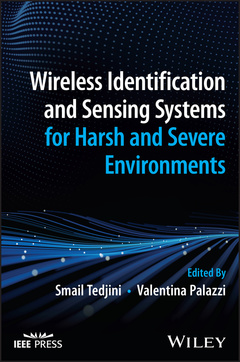Wireless Identification and Sensing Systems for Harsh and Severe Environments
Coordonnateurs : Tedjini Smail, Palazzi Valentina

Comprehensive resource reviewing the state of the art in wireless identification and sensing systems, proposing several examples of applications
While complying with RF standard and regulations, Wireless Identification and Sensing Systems for Harsh and Severe Environments covers the recent advances in wireless and radio-frequency identification (RFID) systems where severe electromagnetic behavior and harsh conditions are taken into consideration, providing the reader with design rules and methodologies to obtain satisfactory performance and avoid the typical oversights and mistakes that can be made when first approaching this topic.
In addition to examples of real implementations, the book gives a general overview of RFID and wireless technologies as well as their pros and cons in terms of expected performance and future directions of technologies. A chapter is dedicated to perspective and evolution towards IoT solutions and artificial intelligence (AI)-enabled applications.
The book furthermore addresses chipless RFID frameworks from the theoretical perspective as well as that of implementation, including examples from scientific literature and commercial solutions. It also describes surface acoustic wave (SAW) sensors in wired and wireless configurations and developments needed to implement the technology.
Wireless Identification and Sensing Systems for Harsh and Severe Environments includes discussion of:
- Frequency diversity for robust Ultra-High Frequency (UHF)-RFID communication, a key technology for future sensor and actuator devices in the Internet of Things, and harmonic transponders for tracking and sensing
- Resonator and reflective delay line configurations, and chipless RFID technology for operations in harsh environments
- Potential of battery-less near-field communication (NFC) sensors using mobile phones as readers in severe environments
- Ultra-wideband (UWB) chipless RFID channel modeling, considering the spatial multipath channel, 3D bi-static rich communication services (RCS) tag model, and analogue effects
Providing comprehensive coverage of the subject and examples of successful implementations of wireless solutions exploiting RFID technologies and enabling systems for the Internet of Things (IoT), Wireless Identification and Sensing Systems for Harsh and Severe Environments is an essential resource for engineers in wireless and RFID technologies.
Smail Tedjini, PhD, is the founder in 1996 and past Director of the LCIS Lab. Now, he is project manager within the ORSYS group that he founded 20 years ago and led until 2014. He co-authored to Wiley title Non-Linearities in Passive RFID Systems: Third Harmonic Concept and Applications (2018).
Valentina Palazzi, PhD, is a researcher with the High Frequency Electronics Laboratory at the University of Perugia. She was vice-chair of IEEE Microwave Theory and Technique Society (MTT-S) Technical Committee (TC)- 26 "RFID, Wireless Sensor and IoT" for the term 2020-2021.
Date de parution : 11-2024



